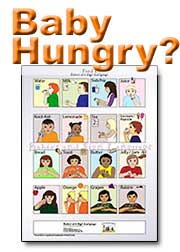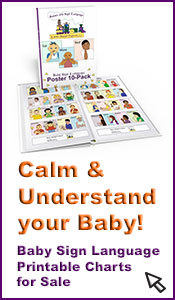How to help your preschooler deal with frustration
Continued from "How to Calm Your Fussy Baby"
Ok, now that you have some tactics to help baby deal with frustration and crying, we can move on to the older toddlers and preschoolers. Preschooler behavior now moves to another level. This becomes a different set of frustrations as your growing baby is, well not so much a baby anymore! With these ideas, you can further help your darling preschooler succeed!
If your child has entered the pre-school phase, here are some common problems that cause frustration:
- Being denied something she or he wants
- Being scolded or disciplined in public
- Becoming overwhelmed by large tasks or responsibilities
- Feeling he is not being recognized
- Unable to express complex emotions
- Preschool separation anxiety
- Being forced to do something he doesnt want to do
- Set clear rules and expectations
Your child is now old enough to express mostly what he or she wants. One of the most likely places s/he will demand something is at the grocery store. If Junior starts making too much of a fuss, and you cannot calm him down immediately, then leave. Just like that. You can come back later. Right now, he needs to be removed from the situation.
Here are some common solutions to calm an upset preschooler:
One way to avoid this from happening is to set clear boundaries before even setting foot in the store. Maybe tell him, Today, you can choose one item and only one item at the store. , or "Today you may choose anything that is less than $5". (You'd be surprised how many little ones can figure this out!) Or try -- At the grocery store today, there will be no treats or toys. Make sure he understands these rules before the actual trip, and again right before going inside the store.
Please keep this as consistent as you can! This helps your young one understand expectations and boundaries. And most importantly - after you leave the store, be sure to give lots of praise if directions were followed!
Sometimes, there may be something she or he will want that she just cant have. These wants are inevitable. However, you can now explain to your little one in a calm and reasonable tone why she cannot always have what she wants. Chances are she will still be upset. You can of course help make her feel better about it, but she still might need time to think about your explanation and the consequences as a result.
- Calm and private discipline
You are out with your child, and he decides it is the best time to throw a tantrum. If you cant calm him down there, then try taking him outside or home. Make sure when you do scold him, it is away from other people. This avoids further frustration because they arent being embarrassed. Always stay calm when correcting him. This may help him regain his calm as well. - Break down and reward tasks.
Asking or telling a preschooler to take on a large task can have the emotional weight of a mountain. If you ask him to clean a messy room, he may become overwhelmed quickly. Offer your help. You could suggest a starting point or break the tasks up into smaller pieces.Its easier for your preschooler to follow, You pick up your clothes, and Ill put away your toys. When we are done with that, we can see what to do next. than Clean your room. You could even make a game of it. Say there is a deadline to meet, and if this room is cleaned within that deadline, he can do something special this weekend.
- Always give praise and support
Perhaps your son has taken a liking to shooting hoops, riding his tricycle, finger-painting, etc. Be sure to be there and give praise and encouragement. Make sure he knows you acknowledge him and recognize his special efforts! - Pre-identify your child's potential stressors.
At this age, your child is experiencing the world differently than before. She has new friends, a new schedule, and new stresses. Be prepared to identify potential problems and help her talk through them.Perhaps one day, your preschooler may feel rejected by one of her play-mates, but doesnt know how to express it. You two can sit down and discussed what happened. Then you can identify the emotion and give a possible solution via an example. Little Suzy should feel great relief in this. You were able to understand how she felt when even she didnt know. As Little Suzy realizes her own emotions more and more, she may be able to diffuse herself before lapsing into a tantrum or meltdown.
- Acknowledge your preschooler's fears calmly and rationally.
It may be the beginning of fall or back from winter break, your child may have separation anxiety at pre-school. The roots of this anxiety are planted in routine. Once a routine is broken (i.e. having to go back to school after a long weekend), the anxiety may start to surface.
Some children may cry and make a fuss, while others might withdraw emotionally and become silent. To help your sweetie overcome this, you can tell him that you will stay for a few minutes, but then have to go. Give him words of encouragement (Youre a big boy and you wont miss me so much in a little bit. You are going to have so much fun today!) Be sure that if you do stay for a moment or two, as promised, and then you can say goodbye to him before you leave.Sneaking out or away from your baby, toddler, or child only develops instant mistrust.
As the school year progresses, their new routine (going to school) will soon become their normal routine. The tears and anxiety should hopefully be minimal by now. If you know it is going to be a particularly rough day emotionally, try letting the teacher know so that s/he and his classmates can help do something to cheer him up. - Explain reasoning behind unwanted tasks.
Forcing preschoolers to do something they dont want is like swimming up-stream. Be sure to give praise often during the activity. Acknowledge that you know she didnt want to go to the activity or task. Take visiting the doctor's office for example. Once you arrive, she would love it if you praise her for behaving so well.
Hearing reason may help reduce the stress your preschooler is feeling. Explain that going to the doctor will keep him or her healthy. Bring a favorite toy or book with you. Play quiet sign language games while in the waiting room. Try giving creative rewards for accomplishments well done.
The world and its new experiences may have changed drastically from when we were growing up, but that doesnt mean we can't arm ourselves with knowledge and be prepared to offer our children everything they require. The beginning may be tough, but as your child grows older, you may find that these tips now can benefit your little sweetie through the years to come.















